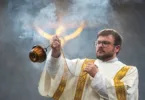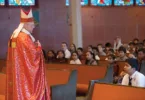by Sean M. Wright
Special to The Leaven
It is therefore a holy and wholesome thought to pray for the dead, that they may be loosed from their sins.
—2 Mc 12: 45b-46
Christian concern for the dead is a legacy bestowed on us by our Jewish forebears in faith who venerate in death the body created in God’s image and likeness. Catholic funeral rites continue this heritage, paying homage to what were once temples of the Holy Spirit, while imploring the intercession of angels and saints in commending their souls to the mercy of our loving Creator.
Catholics benefit from Christian burial rites in emotional, spiritual and practical ways, all of which work together. Three events — referred to as “stations” — comprise a Catholic funeral: the wake, the funeral Mass and the committal.
“In my pastoral experience of 26 years,” said Father Vaughn Winters, pastor of St Mary Church in Palmdale, California, “I find that a lack of final services leads to an emotional barrenness when facing the loss alone. Families able to put time, energy and resources into a proper Catholic funeral experience the benefits of enhanced healing in their time of grief.
“The consolation of faith,” he added, “helps the faithful face and deal with their loss in a positive, constructive way, and the gathering of family and friends provides them with a support network to help them get through the initial difficult time of loss and begin to heal, as they start a new chapter of life without their loved one.”
At the wake, family and friends gather for emotional support, often with the body of the deceased present. It is a time for sharing warm, touching, even amusing anecdotes, as well as recalling his or her achievements in a eulogy.
In some cultures, the wake is accompanied by much festivity, but also includes recitation of the rosary, traditionally led by clergy or members of the decedent’s family.
At the funeral Mass, family and friends gather to grieve the loss while also offering praise and thanksgiving to God for the gift of the person’s life. Following Mass, the sprinkling with holy water and incensation honor the former home of a child of God, united by baptism to the redemptive death and resurrection of Jesus Christ.
The prayers of commendation, notably the “in paradisum” (“into paradise”), are among some of the most beautiful in any Catholic liturgy.
During the committal in the consecrated ground of Catholic cemeteries, the church once more lifts hearts in prayer for the repose of the decedent’s soul, calling on God to grant the person life, peace and joy in his presence forever. Again, the church expresses belief in Christ’s comforting promise: “I am the resurrection and the life. Whoever believes in me, even if he die, yet shall he live” (Jn 11: 25-26a).
Catholic cemeteries, under the direct control of the bishop of each diocese, remain tended, practical and peaceful oases of consolation and spiritual contemplation for the faithful when visiting the graves of family and friends for prayer and loving remembrance.
Michael Crahan, director of sales and marketing for Catholic Cemeteries of Northeast Kansas, works in the practical side of burials. And that work has shown him another aspect of Catholic faithfulness.
“I can’t begin to recount the number of my friends, my children’s friends or simply people met in passing that comment to me once they learn that I work for the church, that they are simply ‘spiritual but not religious,’” he said.
“Ironically, it’s often some of these same people that have recently attended the funeral Mass of a friend or family member,” he continued. “Many will express their appreciation for the beauty, the prayerfulness, the inspiration and consolation they experienced from a Catholic funeral liturgy.
“In fact, we hear a number of these same comments at the Rite of Committal in our cemeteries when they see all of the beautiful symbols of our faith prevalent only in Catholic cemeteries.
“The traditional Catholic funeral can be a source of evangelization,” he added, “the occasion when friends and family members who have ‘de-churched’ reawaken their desire and find a need to again practice their faith. Their hearts are opened to seek to come to know Jesus and draw closer to his church.”
Sean M. Wright, an Emmy-nominated television writer, is a master catechist for the Archdiocese of Los Angeles and RCIA team member at his parish.







